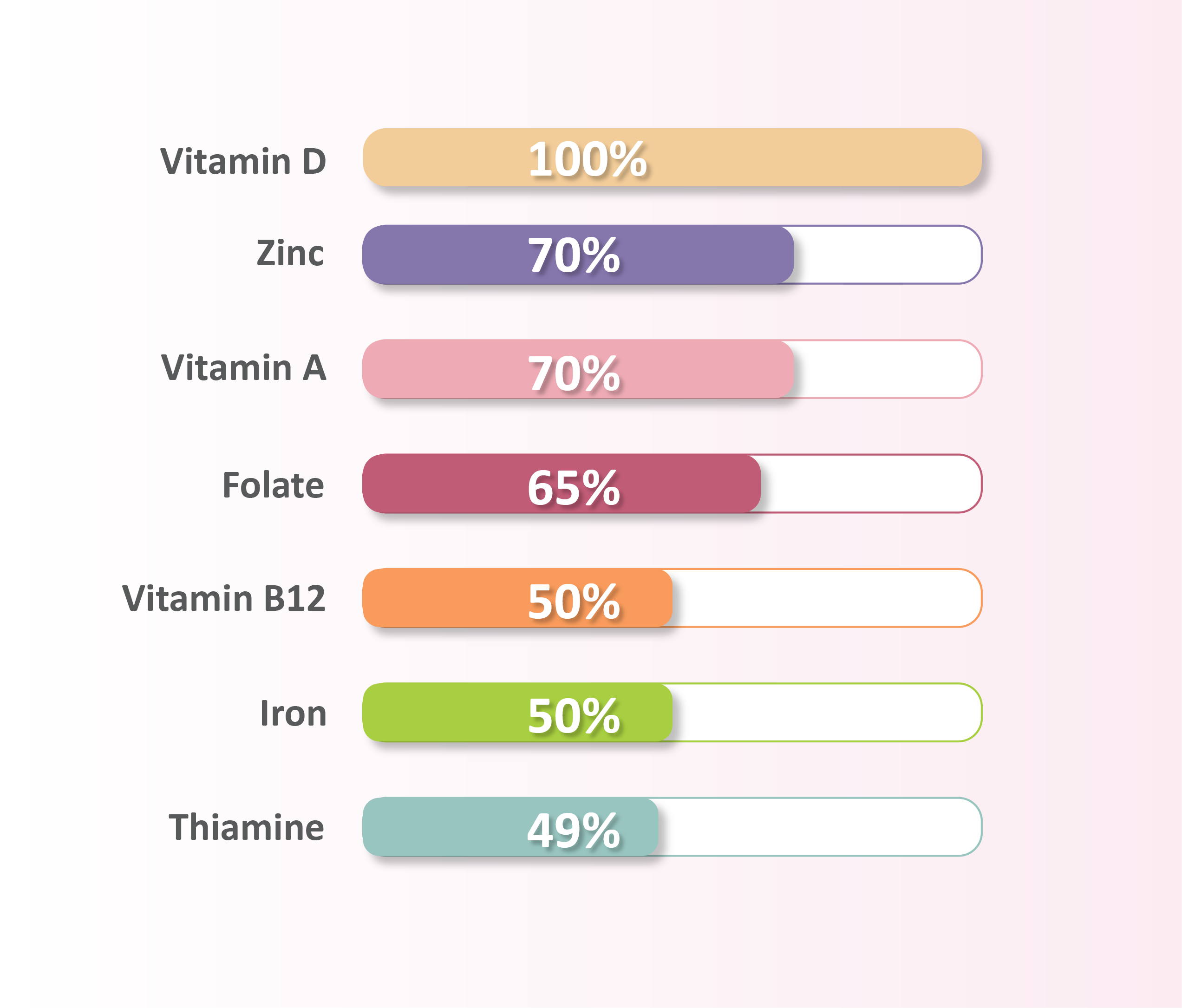Mangelerscheinungen nach einer Magen-OP
Wie entstehen Mängel?
Eine Magenverkleinerung hat große Auswirkungen auf Ihren Körper. Sie können in der Regel weniger essen und fühlen sich schneller satt. Durch die Operation verändert sich Ihr Verdauungssystem in verschiedener Hinsicht:
- Bei manchen Eingriffen wird ein Teil des Dünndarms umgangen, sodass essentielle Vitamine und Mineralstoffe weniger Gelegenheit haben, aufgenommen zu werden.
- Der Magen produziert weniger Magensäure, was die Verdauung von Nährstoffen erschwert.
- Außerdem wird im Magen weniger „intrinsischer Faktor“ gebildet, ein Stoff, der für die Aufnahme von Vitamin B12 notwendig ist.
Ihr neuer Körper hat daher Schwierigkeiten, Nährstoffe wie Vitamine, Mineralstoffe und Proteine aufzunehmen. Selbst wenn Sie sich sehr gesund ernähren: Das Risiko für Mängel an Vitaminen, Mineralstoffen und Proteinen ist hoch. Eine lebenslange Supplementierung mit speziell abgestimmten Produkten ist daher entscheidend, um Ihre Gesundheit zu unterstützen.
Wie erkenne ich einen Mangel?
Ein Mangel an Vitaminen und Mineralstoffen entwickelt sich oft schleichend. Anfangs sind die Beschwerden unspezifisch, sodass Sie sie möglicherweise nicht sofort mit Ihrer Magenoperation in Verbindung bringen. Mit der Zeit werden die Symptome stärker und deutlicher. Häufige Anzeichen von Nährstoffmängeln sind:
- Müdigkeit, Antriebslosigkeit
- Konzentrationsprobleme, Gedächtnisschwäche
- Muskelkrämpfe oder Muskelschwäche
- Haarausfall
- Schlafprobleme
- Reizbarkeit
Wie weiß ich sicher, ob ich Engpässe habe?
Regelmäßige Blutkontrollen sind notwendig, um Mängel rechtzeitig zu erkennen – idealerweise im Krankenhaus oder beim Hausarzt (im ersten Jahr alle 3 Monate, danach halbjährlich oder jährlich).


Welche Mängel treten am häufigsten auf?
Fettlösliche Vitamine
Die Aufnahme von Fetten – und damit auch von fettlöslichen Vitaminen wie Vitamin D, A und E – ist nach einem Bypass vermindert. Mängel können zu Hautproblemen, Nachtblindheit, Muskelschwäche oder Knochenschwund führen.
Zink und Kupfer
Sowohl Zink als auch Kupfer sind wichtig für das Immunsystem und die Wundheilung. Mängel können Haarausfall, Geschmacksverlust und eine verminderte Abwehrkraft verursachen.
Folsäure (Vitamin B9) und Vitamin B1 (Thiamin)
Wichtig für den Energiestoffwechsel. Mängel können neurologische Beschwerden wie Gedächtnisstörungen oder Nervenschäden hervorrufen.


Vitamin B12
Dieses Vitamin ist essenziell für die Bildung roter Blutkörperchen und eine gute Funktion des Nervensystems. Durch den Wegfall des intrinsischen Faktors kann Vitamin B12 kaum noch aufgenommen werden. Ein Mangel führt zu Anämie, Vergesslichkeit, Kribbeln, Muskelschwäche und Müdigkeit.
Calcium
Wichtig für starke Knochen. Bei langfristigem Mangel greift der Körper auf Calcium aus den Knochen zurück, was das Risiko für Osteoporose und Brüche erhöht. Weitere mögliche Beschwerden sind Verwirrtheit, Gedächtnisprobleme, Muskelkrämpfe und Muskelschwäche.
Eisen
Eisen ist wichtig für die Bildung roter Blutkörperchen und hilft, Müdigkeit zu verringern. Bei einem Mangel können Energiemangel, Müdigkeit, Kopfschmerzen, Schwindel und Konzentrationsprobleme auftreten. Schwerer Eisenmangel kann das Immunsystem schwächen und die Anfälligkeit für Krankheiten erhöhen.
Proteine
Proteine sind wichtig für den Aufbau von Zellen und Geweben. Ein Mangel kann zum Abbau von Muskelmasse führen. Nach einem bariatrischen Eingriff ist es oft schwierig, genügend Proteine über die Ernährung aufzunehmen. Angepasste Proteinsupplemente können helfen, einen Mangel zu verhindern.
Wie kann ich einen Mangel verhindern oder ausgleichen?
Eine Magenverkleinerung erfordert lebenslange Aufmerksamkeit für Ernährung und Nahrungsergänzung. Normale Multivitamine reichen meist nicht aus – wählen Sie spezialisierte Supplemente, die auf Ihre neuen Bedürfnisse abgestimmt sind. So verhindern Sie Mängel, bleiben fit und unterstützen langfristig Ihre Gesundheit. Abhängig von Ihren Blutwerten kann es notwendig sein, neben einem Multivitamin- und Calciumpräparat auch zusätzliche Stoffe wie Eisen oder Vitamin B12 einzunehmen, um Mängel auszugleichen.
Consequences of deficiencies?
General vitamin and mineral deficiency
Deficiency of minerals (such as zinc, magnesium, iron, copper, calcium, … ) and vitamins (such as vitamin A, B1, B6, B9, B12, C, D, E, …) deficiency leads to reduced health. Typical complaints are fatigue, trouble concentrating, insomnia, listlessness, muscle cramps, hair loss, …
General calcium deficiency
Calcium is important for bone formation and for the maintenance of strong bones. In case of long-term calcium deficiency, the body will extract calcium from the bones. This may lead to osteoporosis or bone decalcification and/or bone fractures. You may also suffer from confusion, forgetfulness, muscle cramps, muscle weakness, …
Specific vitamin B12 deficiency
Vitamin B12, a water-soluble vitamin, is important for the production of red blood cells and for a normal functioning of the nerves and brains. Vitamin B12 has to bind to the “Intrinsic Factor” for absorption into the body. The “Intrinsic Factor” is produced in the stomach. When part of the stomach has been removed, little to no intrinsic factor can be produced. Vitamin B12 deficiencies are thus inevitable. Lasting vitamin B12 deficiencies may lead to anemia through a decrease of the number of red blood cells, but also to neurological problems such as muscle weakness, confusion, forgetfulness, increased irritability, …
Specific iron deficiency
Iron is an important mineral that supports the production of red blood cells and helps to fight fatigue. An iron deficiency will be noticeable quite quickly: lack of energy, fatigue, headache, dizziness, concentration problems… A clear iron deficiency may reduce your immunity, leading to increased risk of diseases.
Specific vitamin D deficiency
Vitamin D is a fat soluble vitamin, obtained partly from sun exposure (UV light), through the skin, and partly from food. Vitamin D ensures a good immunity and strong bones and teeth by helping with the absorption of calcium and phosphorus from nutrition. In case of a lack of sun exposure and/or a low dietary intake, vitamin D deficiency may occur. Moreover, vitamin D deficiencies are very common among people who have undergone bariatric surgery. That is because vitamin D is stored mainly in the fat mass, as a result of which these people run a great risk of having a vitamin D deficiency already before bariatric surgery. A lasting vitamin D deficiency may lead to several disorders.
Don’t forget the proteins
Proteins are the building blocks of our bodies (bones) and help maintain muscle mass. In case of a lack of proteins, muscle atrophy may occur. After bariatric surgery, it may be difficult to take the daily recommended amount of proteins through nutrition. Supplementation may be recommended to help achieve this goal.







